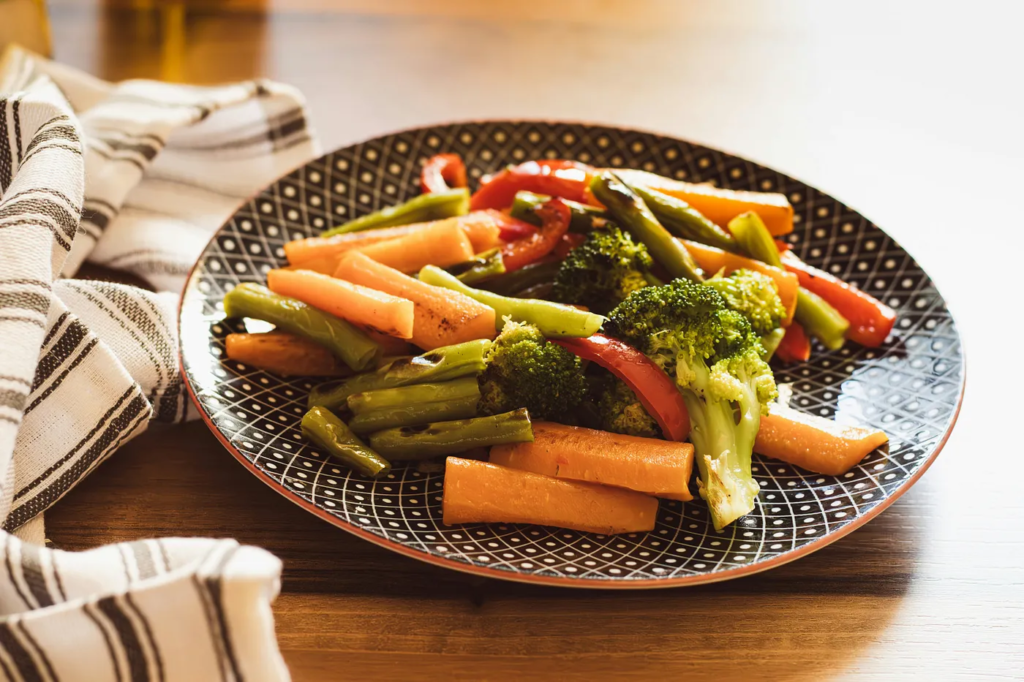Healing through food
In a world where any food can be available at any time, the wisdom of eating seasonally is often overlooked. Yet, this practice, rooted in ancient traditions, could be key to improving our health in the face of rising rates of chronic diseases and inflammation. Let’s explore why incorporating more seasonal foods into our diets can be a powerful step towards better health and well-being.

The Inflammation Connection
Chronic inflammation is at the root of many modern diseases, including heart disease, diabetes, and certain cancers. What we eat can either fuel inflammation or help combat it. Seasonal foods, particularly fruits and vegetables, are packed with anti-inflammatory compounds that can help protect our bodies from these chronic conditions. When you eat produce that’s in season, you’re consuming foods at the peak of their nutritional value. These foods are rich in antioxidants, vitamins, and minerals that work together to reduce inflammation in the body.
Nature’s Bounty Throughout the Year
Each season brings its own unique array of fruits and vegetables, perfectly suited to support our health during that time of year. Let’s explore the bounty each season typically brings and how these foods support our health:
Summer: Cooling and Hydrating
In summer, your body needs hydration to counter increased sweating and fluid loss, cooling foods to help regulate body temperature, sun protection to guard against UV damage, and electrolyte balance to replace minerals lost through sweat. These summer fruits and vegetables are not only refreshing but also packed with nutrients that help our bodies cope with the heat.
- Melons: Melons like watermelon and muskmelon are high in water content and help with hydration, while lycopene present in them offers protection against sun damage.
- Mangoes: Rich in vitamins A and C, they support skin health and boost immunity.
- Berries: Rich in antioxidants, they support overall health and protect against oxidative stress.
- Cucumbers: Hydrating and cooling, they’re rich in nutrients that support skin health.
- Tomatoes: High in lycopene, they offer protection against sun damage and support heart health.
- Coconut Water: Excellent for hydration and electrolyte balance.
- Jamun (Indian Blackberry): High in antioxidants and helps regulate blood sugar levels.

Autumn: Balancing and Nourishing
As temperatures begin to cool, your body needs immune support to prepare for cold and flu season, warming foods to adjust to cooler temperatures, and fibre to support digestive health as activity levels may decrease. These autumn foods provide essential nutrients to prepare our bodies for the cooler months ahead.
- Pumpkins and Squash: Rich in beta-carotene, they support eye health and immune function.
- Fruits: Apples, pears, figs, plums, lime, and grapes are high in fibre and antioxidants, supporting digestive and heart health.
- Leafy Greens: Rich in iron and vitamins, they support overall health.
- Root Vegetables: Provide grounding energy and complex carbohydrates.
- Cruciferous Vegetables: Cabbage, broccoli, and cauliflower are high in nutrients and improve gut health by feeding the good bacteria in your gut.

Winter: Warming and Immune-Boosting
In winter, your body requires immune-boosting nutrients to fight off seasonal illnesses, vitamin D to compensate for less sunlight exposure, and warming, grounding foods to maintain body heat and energy. These winter foods provide the warmth and nourishment our bodies need in colder months while supporting our immune system.
- Citrus Fruits: High in vitamin C, they support immune function.
- Sweet Potatoes: Rich in complex carbohydrates and beta-carotene.
- Cruciferous Vegetables (Broccoli, Brussels Sprouts): Packed with vitamins and anti-inflammatory compounds.
- Pomegranates: Rich in antioxidants, they support heart health.
- Mustard Greens (Sarson): High in vitamins and minerals, they support bone health and immunity.
- Fenugreek Leaves (Methi): Rich in iron and other minerals, supporting blood health.
- Sesame Seeds (Til): High in calcium and healthy fats, they provide warmth and nourishment.
- Jaggery: Rich in iron and acts as a warming sweetener.

Spring: Cleansing and Renewing
As winter transitions to spring, our bodies benefit from foods that support detoxification and renewal. We need detoxification support to help cleanse after heavier winter foods and lighter foods to match increasing activity levels. These spring foods help cleanse and prepare our bodies for the warmer months ahead.
- Asparagus: Supports liver function and aids in detoxification.
- Leafy Spring Greens: Rich in chlorophyll and nutrients that support overall health.
- Peas: High in protein and fibre, supporting digestive health.
- Radishes: Support liver function and offer a crisp, refreshing flavour.
- Amla (Indian Gooseberry): Exceptionally high in vitamin C, boosting immune function and overall health.
Gut Health and Seasonal Eating
The gut microbiome plays a crucial role in our overall health. Eating seasonally supports gut health by:
- Increasing Diversity: Different seasons bring different fruits and vegetables, naturally increasing the variety in your diet and promoting a diverse gut microbiome.
- Providing Fiber-Rich Foods: Seasonal produce is often rich in fibre, which feeds beneficial gut bacteria.
- Offering Prebiotic Foods: Many seasonal vegetables, like garlic and onions, are excellent sources of prebiotics.
- Incorporating Fermented Foods: Traditional fermented foods, often made with seasonal produce, introduce beneficial probiotics to your gut.
The Nutritional Advantage of Seasonal Foods
Fruits and vegetables consumed at peak ripeness, shortly after harvesting, offer maximum nutritional benefits. Here’s why:
- Nutrient Density: Produce allowed to ripen naturally develops its full complement of vitamins, minerals, and phytonutrients.
- Flavour and Satisfaction: Seasonal produce often tastes better, which can increase your enjoyment of healthy foods and encourage you to eat more of them.
- Reduced Transit Time: Locally grown seasonal produce typically spends less time in transit and storage, meaning fewer nutrients are lost before the food reaches your plate.
Practical Tips for Seasonal Eating
- Visit Local Markets: Farmers’ markets and local vendors often offer the freshest seasonal produce.
- Learn About Local Seasons: Familiarise yourself with what grows in your specific region during different times of the year.
- Embrace Traditional Recipes: Many traditional recipes are designed around seasonal ingredients.
- Start Small: Begin by incorporating one or two seasonal items into your weekly meal plan.
- Preserve Seasonal Abundance: Learn preservation techniques like freezing or fermenting to enjoy seasonal flavours year-round.
Conclusion: Honoring Nature’s Wisdom
Incorporating more seasonal foods into your diet is a simple yet powerful way to support your health. By eating in harmony with nature’s cycles, you provide your body with a diverse array of nutrients precisely when it needs them most. This approach naturally combats inflammation, supports gut health, and may help prevent chronic diseases.
Remember, the goal isn’t to completely eliminate out-of-season foods, but rather to add more seasonal variety to your plate. Each season brings its own unique bounty, offering a constantly changing palette of flavors and nutrients to explore. So the next time you’re planning a meal or visiting the market, consider what’s in season in your area. You might be surprised at how this simple shift can transform not just your diet, but your entire relationship with food and your health.
Interested in learning how foods can reduce chronic inflammation in your body? Join the 5-Day Inflammation Detox Workshop and download the Ebook, ‘The Ultimate Guide to Reduce Inflammation: Healing Through Food.’ Discover how small changes can make a big difference in your health!
